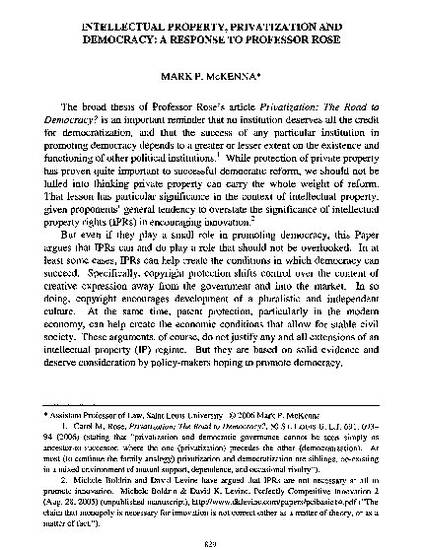
The broad thesis of Professor Rose's article Privatization: The Road to Democracy? is an important reminder that no institution deserves all the credit for democratization, and that the success of any particular institution in promoting democracy depends to a greater or lesser extent on the existence and functioning of other political institutions. While protection of private property has proven quite important to successful democratic reform, we should not be lulled into thinking private property can carry the whole weight of reform. That lesson has particular significance in the context of intellectual property, given proponents general tendency to overstate the significance of intellectual property rights (IPRs) in encouraging innovation.
But even if they play a small role in promoting democracy, this Paper argues that IPRs can and do play a role that should not be overlooked. In at least some cases, IPRs can help create the conditions in which democracy can succeed. Specifically, copyright protection shifts control over the content of creative expression away from the government and into the market. In so doing, copyright encourages development of a pluralistic and independent culture. At the same time, patent protection, particularly in the modem economy, can help create the economic conditions that allow for stable civil society. These arguments, of course, do not justify any and all extensions of an intellectual property (IP) regime. But they are based on solid evidence and deserve consideration by policy-makers hoping to promote democracy.
The overwhelming evidence confirms Rose's broad thesis that IPRs are far from sufficient to secure democracy, and that we should pay close attention to scope. But when we parse out the different forms of intellectual property protection, the evidence also suggests that the case for IPRs as promoters of democracy is somewhat stronger than Rose lets on. Thus, intellectual property deserves its seat at the policy table, and we are wise to pay it some heed.
Available at: http://works.bepress.com/mark_p_mckenna/8/

Reprinted with permission of the St. Louis University Law Journal © 2006 St. Louis University School of Law, St. Louis, Missouri.